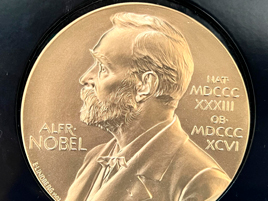Brought to you by Primus - a smart choice for your Internet and Home Phone services.

You wouldn’t think of little ol’ Canada as being a Nobel-producing powerhouse, but we produce scientific, literary, and humanitarian work with the best of 'em. Here are 13 Canadians who have been honoured as Nobel laureates.
Sidney Altman
Montreal, Quebec
Altman shared a 1989 Nobel Prize in Chemistry with Thomas R. Cech for demonstrating that RNA can also function as an enzyme; prior, it was thought that only proteins could be enzymes.
Frederick Banting
Alliston, Ontario
If you know one Canadian winner of the Nobel Prize, it’s probably Frederick Banting, who won the 1923 Nobel Prize in Medicine for his discovery of insulin. He shared the prize with his supervisor, John Macleod, whom we’ll cover later. Prior to Banting’s discovery, diabetics generally died within a year of being diagnosed, so the discovery of insulin was immediately significant. In fact, at age 32, Banting was the youngest-ever winner of a Nobel Prize in Medicine.
Saul Bellow
Lachine, Quebec
Bellow won the 1976 Nobel Prize in Literature. He’s best known for his picaresque novel, where a quick-witted protagonist gets by on cunning and guile, but with a philosophical tone. A good place to start is with his novel The Adventures of Augie March.
Willard Boyle
Amherst, Nova Scotia
Boyle shared the Nobel Prize in Physics in 2009 for his invention of the charge-coupled device, an imaging semiconductor circuit important for use in digital cameras.
Bertram Brockhouse
Lethbridge, Alberta
Brockhouse won the Nobel Prize in Physics in 1994 for developing neutron spectroscopy, which is important in medicine because it’s used in radiation therapy. It’s also used in nuclear fusion experiments.
David Card
Guelph, Ontario
Card won the Nobel Memorial Prize in Economic Sciences in 2021 for research that showed that higher minimum wage does not lead to less hiring and immigration does not lower pay for native-born labour.
William Giauque
Niagara Falls, Ontario
Giauque won a Nobel Prize in Chemistry in 1949 for his work on how matter functions when it is close to absolute zero in temperature.
Gerhard Herzberg
Hamburg, Imperial Germany
Herzberg, who fled Nazi persecution by coming to Canada, won the 1971 Nobel Prize in Chemistry “for his contributions to the knowledge of electronic structure and geometry of molecules, particularly free radicals.” Not bad for a guy who had to flee with his wife, with only their belongings and the equivalent of $2.50.
David H. Hubel
Windsor, Ontario
Hubel shared a Nobel Prize in Medicine in 1981 with Torsten Wiesel for their discoveries on information processing in the visual cortex.
Charles Brenton Huggins
Halifax, Nova Scotia
Huggins won a Nobel Prize in Medicine in 1966 for discovering that hormones could be used to control the spread of certain cancers. In fact, this was the first time that it was shown that chemicals could be used to control the spread of cancer.
John Macleod
Clunie, Perthshire, Scotland
Macleod was awarded the same Nobel Prize in Medicine in 1923 as the aforementioned Banting, for their work on insulin. However, there was some drama at the time, as Banting took the majority of the credit for the discovery and said that Macleod’s contributions were negligible. However, subsequent historical scholarship shows that Macleod did indeed play an important role in the discovery. Furthermore, the Nobel committee had neglected the roles of Charles Best and James Collip. Ultimately, Banting shared his prize money with Best, and Macleod shared his with Collip. The Nobel committee later admitted that they should have cited Best too.
Rudolph A. Marcus
Montreal, Quebec
Marcus won his 1992 Nobel Prize in Chemistry “for his contributions to the theory of electron transfer reactions in chemical systems.”
Arthur B. McDonald
Sydney, Nova Scotia
McDonald won the Nobel Prize in Physics in 2015 with Takaaki Kajita for discovering neutrino oscillations, which shows that neutrinos have mass.





